As promised in my post about Steemit economy and its currencies two days ago, this post is going to explain how Steemit reward system works and how it is distributed among Steemit users. To thoroughly understand the content of this post, it is recommended that you go through the previous post because both these posts cover Steemit economy and reward structure.
Previous Post: Understanding The Steemit Economy & Steemit Currencies Powered By Steem Blockchain
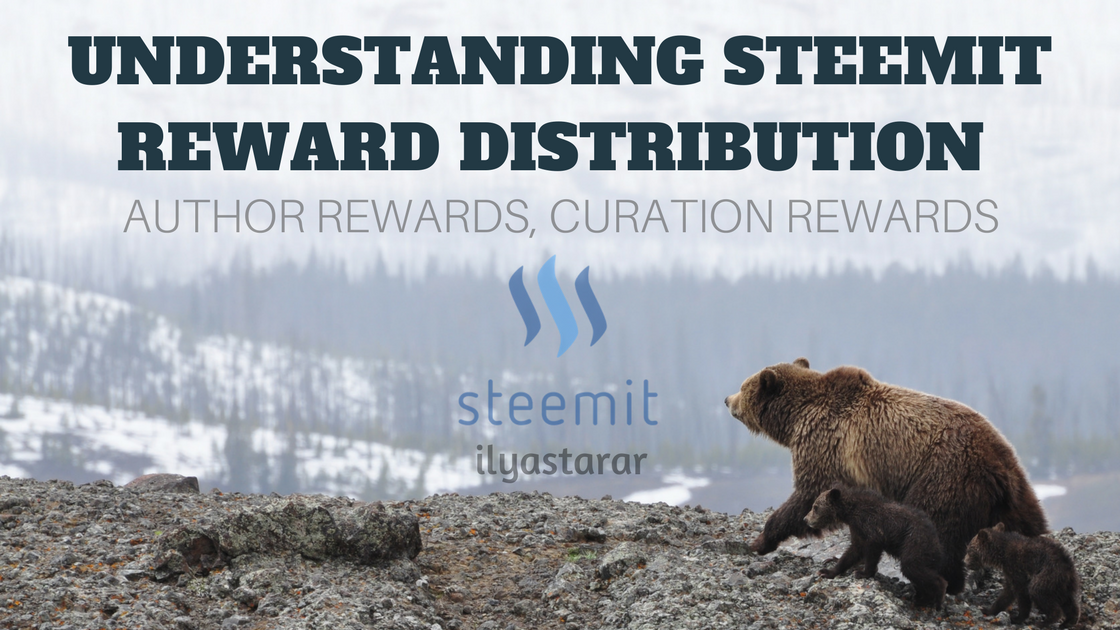
Image is designed by me via free online tool Canva.com and you are welcome to let me know if you find a relationship between bears and Steemit rewards.
If you'd like to know the struggle behind this post, you may read this post. Without any delay, let's move to the main topic.
Three Things to Know About Steemit Rewards Distribution
Before going into the details of the actual distribution, there are three things about the rewards that you need to know. All of them are briefly discussed below.
1. Rewards are Shown in One Currency Only
This seems simple but it is not. All the rewards on your posts and comments are shown with an amount preceded by $ sign. This $ sign means US dollars (USD) but in actuality, its value can be much less or more (currently more) than what the shown amount is. I will explain later.
For now, just remember that Steem blockchain used $ sign because it was logical to do so. However, for the best part of few many weeks and months now, the actual USD value of Steemit rewards has been much more than the $ sign shows. It will also be explained.
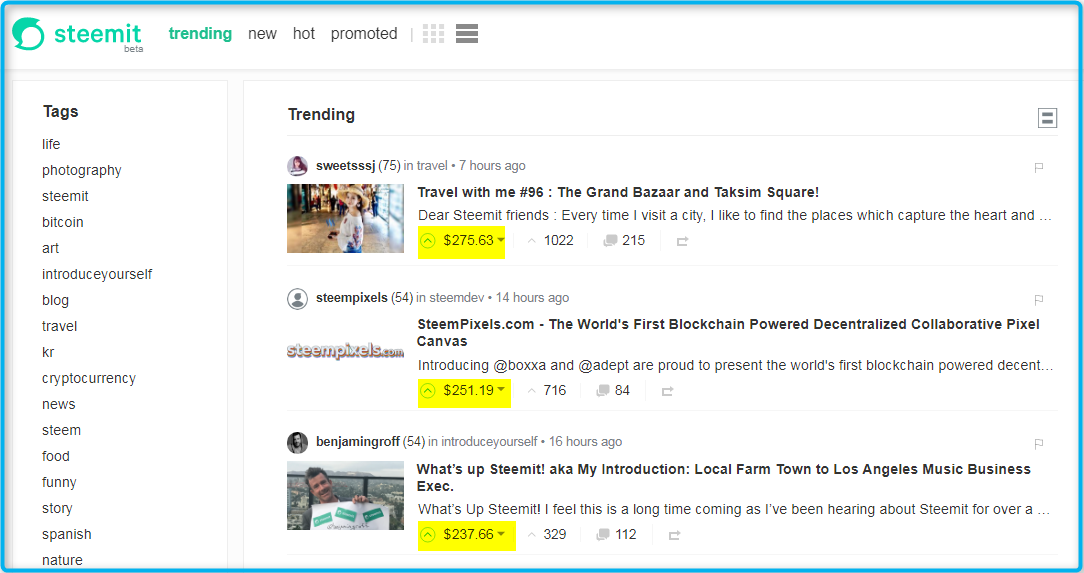
The amount mentioned with $ sign is not what you will be paid. But it determines what you get. Your rewards will be converted to Steem Power (SP) and Steem Dollars (SBD) depending on whether you want both or just the SP. Again, everything is explained in the post.
2. Rewards are Paid in Two Currencies
This is where things get a little complicated for innocent minnows and new fishes. The rewards, which are shown with $ , are paid (sent to your wallet) in two currencies; Steem dollars (SBD) and Steem Power (SP). How this division is done will be explained a little later in this post.
3. Rewards Can be Converted to All Three Currencies
Things get way complicated here but it's basically pretty simple. You get SBD and SP as reward from posts, comments and curation (the upvotes you do on others' posts). The only currency that remains is Steem.
- Well, you can buy Steem directly from the internal market against SBD. You pay in SBD and get Steem in your wallet.
- To convert SP into SBD or Steem, you'll have to go through a process called Powering Down. It is so named because powering down decreases your influence and value of your upvotes.
- When you start power down, SP is converted to Steem in 13 equal installments over a period of 13 weeks, starting one week from the time the operation starts. It can be cancelled any time.
- To convert SP into SBD, first you'll have to power down to Steem and then sell Steem for SBD in the currency market.
This broader understanding of Steem, Steem Dollar and Steem Power will help you understand the next part where exact distribution of these rewards is explained.
The Actual Steemit Rewards Distribution : Amounts, Percentages & Value
If you think you had enough twisting already, think again. You're in for another round of clarifying your doubts about rewards. Let's get over with this reward thing once and for all.
Rewards are Shared Between Authors and Curators
The amount in $ that you seen on your posts and comments is divided as follows.
- At least 75 % of the amount goes to the author i.e. you.
- At most 25 % of the amount is distributed among the curators; the people who upvoted on it.
The phrases at most and at least have some significance which is explained later in the post. To exemplify the above distribution, let me show you the final payout distribution on one of my recent posts. In the screenshot below, the final payout on this post is shown.
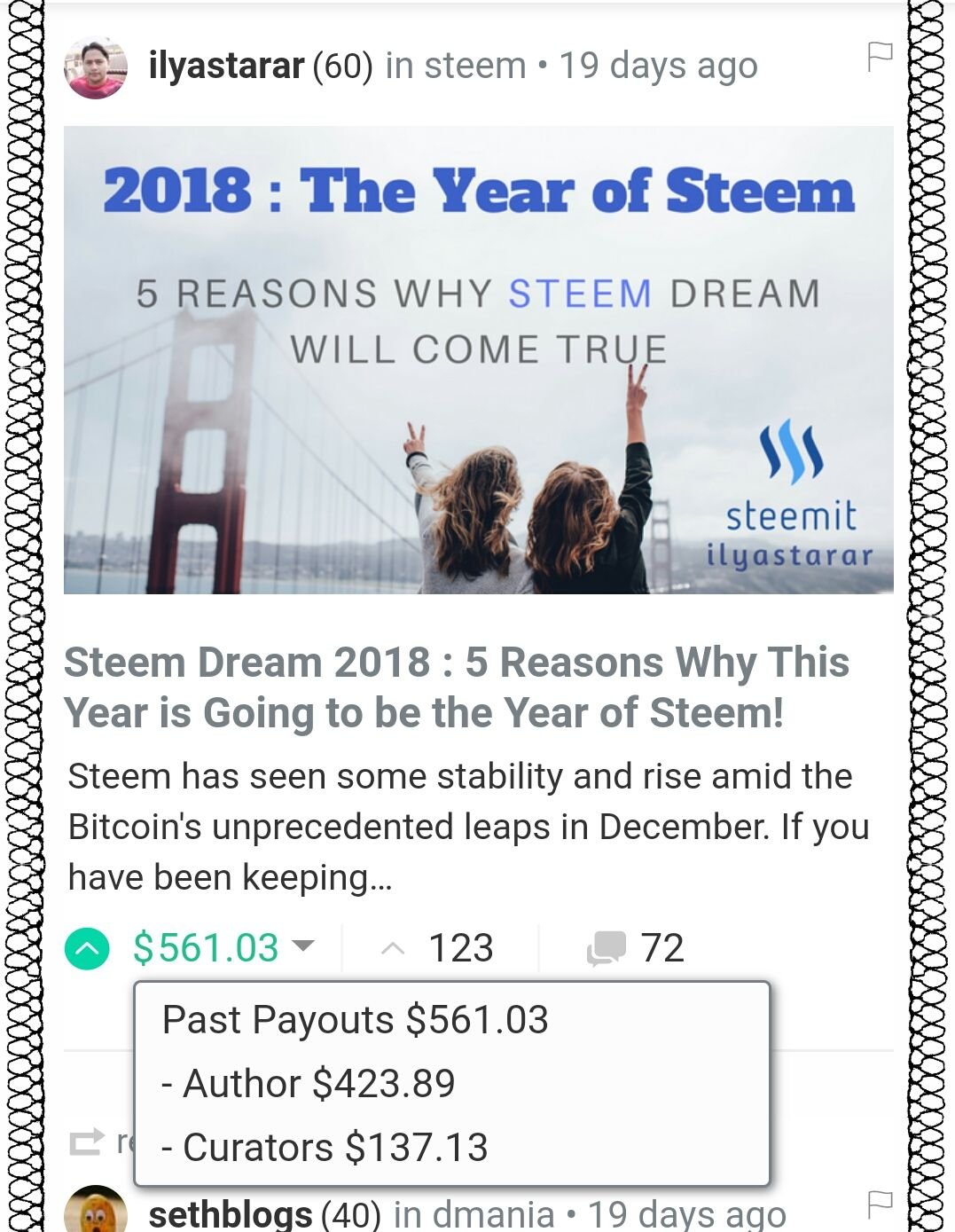
You can clearly see how the reward has been distributed between author and curators. Let's do some math to verify the percentages.
- Total Amount = $561.03 (Amount is the total number of SBD the post would have earned if 100 % reward was paid in SBD)
- Author Share = $423.89 (Doing the math, 423.89 is just almost 75 % of 561.03)
- Curators Share = $137.13 (Which is just less 25 % of the payout amount)
Clear till here? The final thing you need is the final disbursement of author and curators rewards to the respective wallets. The process needs some serious mathematics and may not be as simple as getting 75 % of the post payout.
But after enhancing your knowledge about the final disbursement of rewards into your wallet, you will be able to decide what options you want to choose for you and it will help you calculate your profits from the popular voting bots as well, if you use any.
How The Share of Authors is Paid?
There are two important facts that we established till now about rewards.
- Steemit rewards are paid in two currencies; SBD and SP.
- 75 % reward from the posts or comments goes to the author.
Keep these in mind. They are useful for further discussion. Author rewards are rewarded as per the option chosen by the users so it is logical to discuss those options alongside the distribution. Remember, what you get as payout depends on what payout option you have chosen.
How Author's Share Translates to SBD and SP?
When you write a post, you may have noticed a small option with the name of Rewards. After it is a box normally saying Default (50 % / 50 %). When you click the box, some options come up. See the image below.
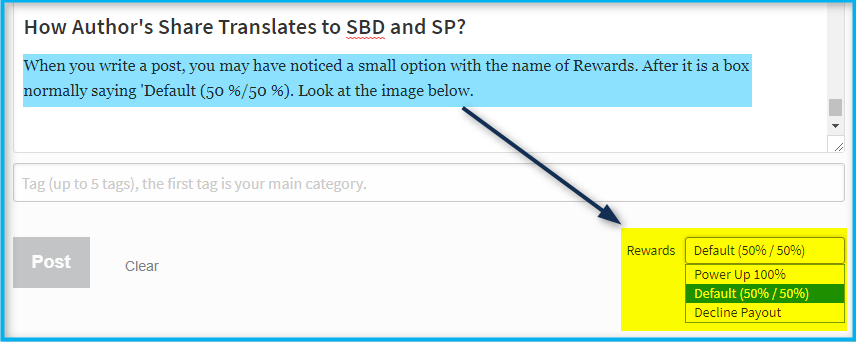
The default option is most common as it distributes the whole reward into SBD and SP. I'll explain which option to choose. For now, let's start doing maths to find out reward distribution.
- Suppose (just like in all those math books), one of your post shows $100 reward. Now, if you're using default option, the distribution will be as follows.
- Reward gets divided into authors and curators in 75 % / 25 % ratio. You have $75 left as author reward. This $75 will be paid out as Steem Dollars and Steem Power. The process is explained below.
Now, if you're using default option, your $75 will be divided in to two equal parts; in SBD and SP (50 % / 50 %). Let's study each of them.
- SBD: Default option means you'll get 37.5 SBD (50 % of $75) in your wallet. So, your payout will be 37.5 SBD, other than the SP. The reason for this is that one SBD is pegged to $1 in value no matter what the actual price. It is explained later exclusively. Let's look at SP now.
- SP: The other $37.5 will be converted into SP. As the SP conversion depends on Steem's price, you won't get 37.5 SP straight away. As per the current at price of Steem (at the time of writing, but prone to frequent volatility), 1 Steem = $4.95

- We know that the other 50 % ($37.5) will be converted into SP. We also know that SP is basically vested Steem. Therefore, we will have to see what amount of Steem can be purchased by spending 37.5 USD. When we do the math, we get the exact amount. i.e. 37.5/4.95 = 7.575 SP.
- So, your final wallet earnings from a $100 post payout will be 37.5 SBD and 7.575 SP as per above calculations.
Let me now show you the author reward I finally got from the post I showed in the screenhot above. Out of the $561.03 author share, I got 50 % SBD (211.947 SP) and the other 50 % was converted to SP (33.716 SP) as per price of Steem and paid in my wallet. As per the payout, price of Steem was considered to be $6.286 (211.947/33.716), which was the median price of Steem at the time of payout, almost two weeks ago.
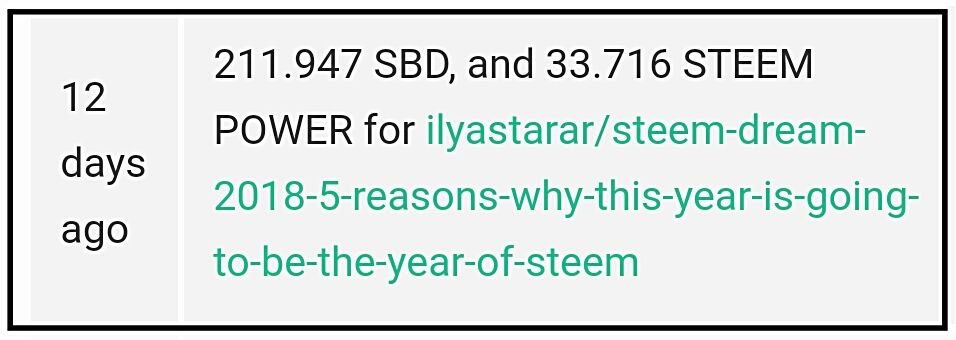
I hope this example has helped you see for yourself how payouts are finalized and how author rewards are distributed. Just one last clarification regarding author rewards.
Getting More than 75 % Share in Author Rewards?
If you see that the value of SBD and SP is more than 75 % of final payout, it is because you must have received a portion of curation reward as well. In such a case, curation rewards will be slightly less than 25 %, as in my post payout shown above. Curation rewards are discussed right below. Your share, however, will never be less than 75 % until policies are changed.
Choosing Payout Options
Let me explain the three payout options for you and share with you which one is profitable and under which circumstances.
1. Default (50 % / 50 %)
How this option works has already been well explained above. It is the most profitable option at the moment because the 50 % SBD portion is worth hundreds of dollars. When I received the payout of the example post, SBD was trading above $10 (meaning $2100+ value) and Steem was trading above $7 (meaning $230+ value). That's more than $2300 for a single post.
2. Power Up 100 %
If you use 'Power Up 100 %' option, all your post payout will be paid out as Steem Power as per the formula given above (in this example post, 75/4.95 = 15.15 SP) which is not profitable at all because you will get $75 worth of Steem only. Another downside of 100 % payout is that you get SP which is not liquid (immediately sell-able or transferable).
If I had chosen this option, I would have got just $471 value in form of 67.4 SP. Compare that with $2300+ I actually got.
Note:- Payout will still be distributed between author and curators (75 / 25 % ratio).
3. Decline Payout
If you choose Decline Payout option, your post will not receive any payout. Nothing will be added to your wallet. The amount corresponding to upvotes will still be shown in payouts but with a strike. Steemit official accounts and witnesses often use this option to keep the reward pool for their users and not take money out of it.
I used this option on two of my posts last week. You can see one of them here. I used the option because my post was not valuable enough to deserve any rewards and I just needed to pass on some information.
See the screenshot of a recent post by @ned for example. When I took the screenshot from his blog, I found an active post by @steemitblog which has declined payout. It shows a strike. Ned's post payout has been finalized therefore its shows $0.00 despite 332 upvotes. I remember this post having more than $800 showing.

"Ilyas, Tell Me Which Payout Option I Should Choose & Why!"
I prefer 50/50 payout because SBD gives me flexibility to trade it with Steem in the internal market, making profit in the process. Read this post for example and see what I am talking about. I sold Steem at 1.35 and bought back at 1.10 in the internal market. It was 22.7 % profit for me. Could have held on and buy back at 0.14 (89.63 % profit) but I didn't know that such a time will come.
1. When Steem is Under $1 But Higher in Value Than SBD...
You can choose Power Up 100 % because you will get more Steem. For $75 author share, you will get more than 75 SP. I don't know if Steem will ever go under $1 anymore but we all have seen craziest things happening in crypto so you never know.
2. If SBD is Higher in Value than Steem...
Choose Default (50 / 50) option because you will get liquid SBD which will have more value than the corresponding SP you will get.
3. When SBD is well over $1 (Like Now)...
Always go for Default (50 / 50) option. If there was a 100 % SBD option, I would use that in such a case because every $1 shown in the payout is worth $8.02 right now! The 37.5 SBD from a $100 payout means $300 right now!
In summary, Default (50 / 50) may prove to be a suitable option if used without switching to 100 % Power Up option. I have always used this option or declined payout.
How is Curation Reward Paid?
There needs to be a detailed post about how curation works (and there is) but here are some points pertaining to this blog post.
- Curation reward is paid in SP only. 25 % of payout amount goes to curators. But there are algorithms monitoring curation reward and they are more complex than author payout algorithm.
- If a post receives upvotes immediately after posting, nearly 100 % curation reward goes to the author; you. Curation reward keeps increasing up to 30 minutes.
- If it is upvoted 30 minutes after publishing, 100 % curation reward goes to the curator.
You can earn curation reward from others' posts as others can earn it from your posts. I haven't touched curation much due to the fact that @calamus056 has explained curation rewards in great detail. You must go through the post as it is one of the best resources on curation reward system.
With the major portion of this post on Steemit reward distribution system, I will share some useful information about reward system before concluding.
Important Information About Steemit Reward System
There are some things you should know and understand to make the best out of Steemit. Some of them are crucial.
1. Post Payout is Finalized in 7 Days
Every post or comment has exactly 6 days and 12 hours to get upvoted. It can be upvoted after that too but you won't get anything. After this period, post payout is calculated and then finalized upon completion of 7 days and rewards are sent to your wallet. Put your marketing efforts during these 7 days only.
One more thing I experienced is that if a post has been flagged and made hidden due to heavy downvote, it can be made visible only during the 7 days. Once this period is gone, no amount of upvotes can bring it back to visibility.
2. Value of Upvote Depends on Voting Power
If you have not voted for a single time, you have 100 % voting power left. With each full vote (100 % vote), your voting power reduces by 2 %. It means if you give 10 full votes per day, your end balance would be 80 % voting power. But at 80 % VP, the value of your upvote in terms of $ would also be 80 % of what it was when you had 100 % VP.
Note:- Voting Power keeps regenerating and it will go from 0 % to 100 % in 5 complete days (if not consumed through voting). So, as you vote the VP goes down but at the same time your VP also regenerates daily (20 % per day, 2 % in 2.4 hours) so there's nothing to worry about unless you are voting too many times.
3. Use SteemNow.com to See Your and Others' Vote Value & VP
SteemNow is a wonderful tool designed by @penguinpablo. I primarily used it to know my Reputation score but it is very useful for viewing yours and others' voting power and vote value. Here's my screenshot at the moment.
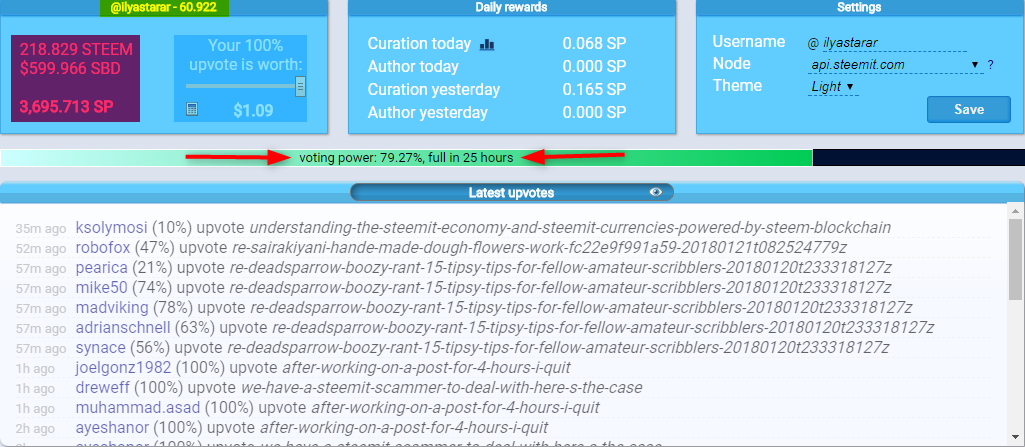
By scrolling down, you can also see you curation and outstanding post rewards.
4. Relation Between Reward System and Reputation Score
This is extremely important to know. Your reputation score tells you and others where you stand on Steemit. It is a good indicator of how hard you have worked, how much success you got and how much you have earned.
Your reputation score increases only when you receive an upvote having some value the increase in the reputation, which happens immediately, is directly proportional to the value of the upvote your post or comment receives.
Also know that going from number n to n+1 (i.e 35 to 36 for example) is more difficult than going from n-1 to n (34 to 36). To the point that going from 59 to 60 was more difficult for me to than going from 25 to 55.
Related Resource: Reputation Score 101 : What is Steemit Reputation Score, How is It Calculated and Why Should We Bother?
5. How is Your Account Value in USD Calculated?
If you look at your wallet, there's an amount called Estimated Account Value. It is calculated based on what you own in the wallet. Whatever amount of Steem, SP and SBD you have in the account adds towards the total value. However, SP delegated to you is not added or subtracted. Otherwise my account value would have $12000 more than it currently shows.
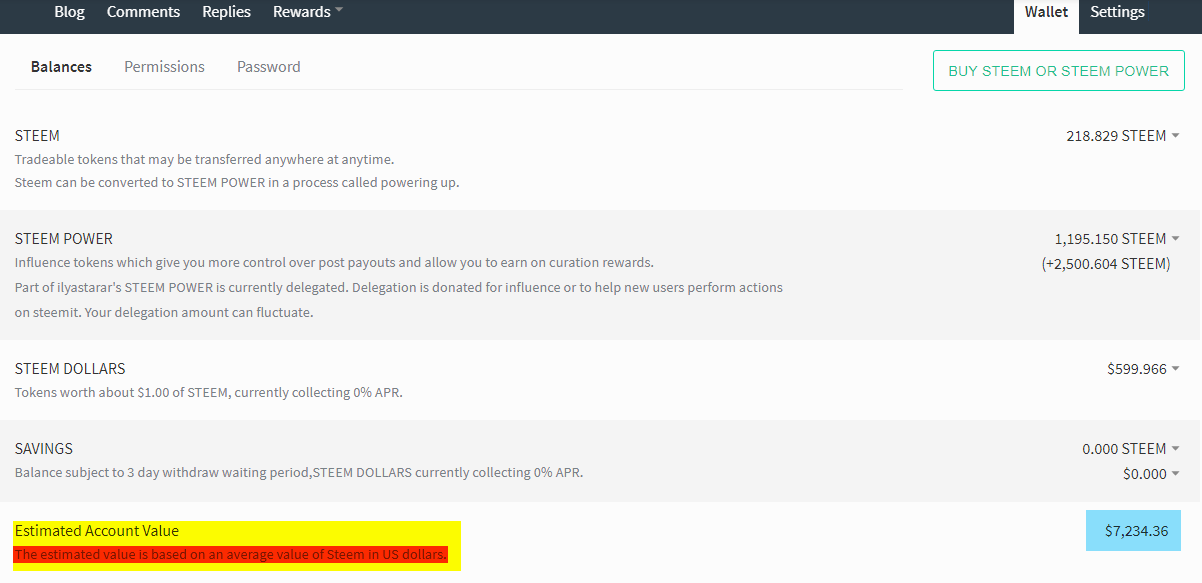
The value is not based on current price of Steem and SBD but the average price of last 7 days. So, the actual value of your holdings can be more or less than what is shown. My colleague and friend @jbn has covered the topic in detail. I am linking it for you.
Detailed Study: Your Estimated Account Value is Way More Than You Think It Is : Everything About Steem Wallet Value
6. Things You Can Do with Steemit Rewards
I compiled a list of 9 things you can do with Steemit rewards. People found it useful when I published it and I am sure you will find it useful too. I have since gained more insight and will publish an updated version of the things that can be done with Steemit rewards. It would be a super useful version and will take some time.
7. Steemit Rewards FAQ
I am including the Rewards FAQ post by @dragosroua, who simply answered the most frequently asked questions. Newbies should definitely read it up.
8. Where Do The 25 % Inflation Tokens Go?
We know that 75 % of inflation tokens come to reward pool. If you do not know this, do read the previous post that I linked in the beginning. But where do the other 25 % go? Let's see.
- 15 % tokens (of the remaining 25 %) are distributed to SP holders as an incentive to hold Steem in form of SP, which keeps the Steem supply limited and helps keep the token price up (demand and supply dynamics).
- 10 % tokens are distributed among Witnesses (people chosen by Steemians' vote to produce blocks of Steem blockchain, process Steem data and make important decisions pertaining to the blockchain).
9. Why is $ Sign Used?
Finally, let's discuss, and remove the confusion around it, why $ sign is used by Steemit and why Steem blockchain considers it the value equivalent to USD value of a post. We have already seen that 75 % of the final reward showed $423 but was actually worth more than $2300.
The answer lies in SBD. SBD is Steem Dollar and it was pegged to remain close to $1 in value. So, logically, Steem blockchain considered post payouts to be almost equal to the actually show amount. If SBD = $1, the whole consideration is 100 percent true. For a $100 payout, 37.5 SBD will mean $37.5 and the value of rewarded SP will also be exactly $37.5 (it still is). Curation rewards will also be equal to $25 in value.
So, the use of $ sign was logical until the price of SBD was pumped due to huge demand on the external exchanges. I hope the whole system is clear now. I have covered reward system earlier too but I admit that my understanding was limited in some aspects. This post was much needed because it contains updated and fairly accurate information. If you find an error, do let me know.
Conclusion
That's all about Steemit rewards. I hope this research paper helps you understand the reward system better and use the information to your maximum benefit. This detailed analysis is part of my mission to leverage my brain to make Steemit the platform we all want it to be. Proof of brain, remember?
If you have any question, do share it in the comments. It would be kind of you to support this post through your valuable upvotes and resteems. Helping this post with upvotes will not only benefit the community at large, but also will encourage me to put more effort into educating Steemians to create a better ecosystem on Steemit.
